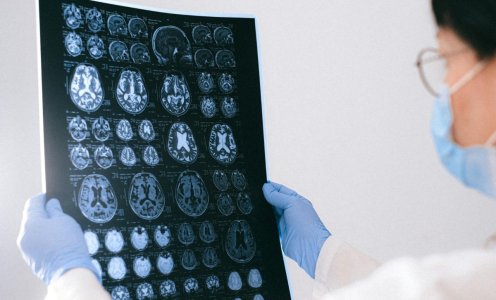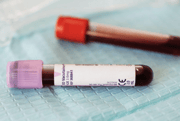Could a simple blood test reveal who’s more likely to experience fast-developing Alzheimer’s?
By
Veronica E.
- Replies 0
Disclaimer: The information provided in this article is for educational purposes only and is not intended as a substitute for professional medical advice, diagnosis, or treatment. Always consult your physician or other qualified healthcare providers with any questions you may have regarding a medical condition or before making any changes to your health regimen.
Imagine being able to predict how quickly someone with early memory loss might decline—just from a simple blood test.
For families navigating the uncertainty of Alzheimer’s, that kind of insight could offer both clarity and comfort.
Thanks to new research, this possibility is moving closer to reality.
Alzheimer’s disease remains the most common form of dementia, affecting millions of older adults and their families.
One of the hardest parts of an early diagnosis is the uncertainty. When someone is told they have mild cognitive impairment (MCI), often seen as an early stage of Alzheimer’s, the question families ask most is: “How fast will this get worse?”
Until now, doctors haven’t had a reliable answer. But a new study presented at the European Academy of Neurology Congress may change that.
Researchers from the University of Brescia in Italy have found that a common blood test—already available in most hospital labs—could help identify people with MCI who are more likely to experience a rapid decline.

Understanding the TyG index
The key lies in what’s called the triglyceride-glucose (TyG) index. This index is a marker of insulin resistance—a condition where the body becomes less responsive to insulin, which is essential for processing blood sugar.
While insulin resistance is usually associated with diabetes, scientists are learning it may also play a key role in how Alzheimer’s progresses.
In the study, 315 individuals with cognitive concerns were evaluated, including 200 with Alzheimer’s. Among participants with MCI due to Alzheimer’s, those with the highest TyG index scores declined four times faster over a three-year period compared to those with lower scores.
Also read: Bill Gates shares a hopeful update in the fight against Alzheimer’s
Why insulin resistance affects the brain
The brain depends on glucose for energy—it uses about 20% of the body’s supply. When insulin resistance sets in, the brain’s ability to use glucose is impaired. This can cause inflammation, damage the brain’s protective barrier, and contribute to the buildup of harmful proteins like amyloid, which is linked to Alzheimer’s disease.
The researchers also noted that people with high TyG scores had more cardiovascular risk factors and blood-brain barrier damage, further supporting the connection between metabolic health and Alzheimer’s progression.
Importantly, this link was not seen in other types of neurodegenerative conditions, suggesting the TyG index may be uniquely tied to Alzheimer’s.
Also read: Unlock the secret early detector of Alzheimer’s: This simple DIY test could reveal clues in advance!
What this means for patients and families
For people living with mild cognitive impairment, this test may be a powerful tool to guide next steps. Knowing who’s more likely to experience a rapid decline can help doctors and families make decisions about care, monitoring, and even participation in clinical trials.
“Our data shows that a simple metabolic marker available in every hospital laboratory can help identify more vulnerable subjects who may be suitable candidates for targeted therapy or specific intervention strategies,” said Dr. Bianca Gumina, who led the study.
Also read: Could this simple diet trick lower your blood pressure—even if you have diabetes?
A step toward prevention and proactive care
Although this test isn’t yet widely used in the US for Alzheimer’s screening, it’s part of a growing movement toward personalized care. The findings also remind us how closely brain health is tied to overall physical health—including things like blood sugar and cholesterol.
If you’re concerned about Alzheimer’s, here are a few things you can do now:
As researchers continue to study the TyG index, this simple test may eventually become part of standard care for those at risk of Alzheimer’s. It also opens the door to potential new treatments that target insulin resistance in the brain—possibly slowing down or preventing cognitive decline.
Read next: You won't believe how this simple daily beverage can dramatically improve your health!

Have you or a loved one dealt with uncertainty after an Alzheimer’s or MCI diagnosis? Would you take a blood test that could offer more answers? What steps are you taking to support brain health?
We’d love to hear your thoughts in the comments. Stories like yours help others feel less alone—and more empowered.
Imagine being able to predict how quickly someone with early memory loss might decline—just from a simple blood test.
For families navigating the uncertainty of Alzheimer’s, that kind of insight could offer both clarity and comfort.
Thanks to new research, this possibility is moving closer to reality.
Alzheimer’s disease remains the most common form of dementia, affecting millions of older adults and their families.
One of the hardest parts of an early diagnosis is the uncertainty. When someone is told they have mild cognitive impairment (MCI), often seen as an early stage of Alzheimer’s, the question families ask most is: “How fast will this get worse?”
Until now, doctors haven’t had a reliable answer. But a new study presented at the European Academy of Neurology Congress may change that.
Researchers from the University of Brescia in Italy have found that a common blood test—already available in most hospital labs—could help identify people with MCI who are more likely to experience a rapid decline.

A new study suggests a simple blood test could help predict how quickly Alzheimer’s may progress, offering hope for earlier intervention and targeted care. Image Source: Pexels / Anna Shvets.
Understanding the TyG index
The key lies in what’s called the triglyceride-glucose (TyG) index. This index is a marker of insulin resistance—a condition where the body becomes less responsive to insulin, which is essential for processing blood sugar.
While insulin resistance is usually associated with diabetes, scientists are learning it may also play a key role in how Alzheimer’s progresses.
In the study, 315 individuals with cognitive concerns were evaluated, including 200 with Alzheimer’s. Among participants with MCI due to Alzheimer’s, those with the highest TyG index scores declined four times faster over a three-year period compared to those with lower scores.
Also read: Bill Gates shares a hopeful update in the fight against Alzheimer’s
Why insulin resistance affects the brain
The brain depends on glucose for energy—it uses about 20% of the body’s supply. When insulin resistance sets in, the brain’s ability to use glucose is impaired. This can cause inflammation, damage the brain’s protective barrier, and contribute to the buildup of harmful proteins like amyloid, which is linked to Alzheimer’s disease.
The researchers also noted that people with high TyG scores had more cardiovascular risk factors and blood-brain barrier damage, further supporting the connection between metabolic health and Alzheimer’s progression.
Importantly, this link was not seen in other types of neurodegenerative conditions, suggesting the TyG index may be uniquely tied to Alzheimer’s.
Also read: Unlock the secret early detector of Alzheimer’s: This simple DIY test could reveal clues in advance!
What this means for patients and families
For people living with mild cognitive impairment, this test may be a powerful tool to guide next steps. Knowing who’s more likely to experience a rapid decline can help doctors and families make decisions about care, monitoring, and even participation in clinical trials.
“Our data shows that a simple metabolic marker available in every hospital laboratory can help identify more vulnerable subjects who may be suitable candidates for targeted therapy or specific intervention strategies,” said Dr. Bianca Gumina, who led the study.
Also read: Could this simple diet trick lower your blood pressure—even if you have diabetes?
A step toward prevention and proactive care
Although this test isn’t yet widely used in the US for Alzheimer’s screening, it’s part of a growing movement toward personalized care. The findings also remind us how closely brain health is tied to overall physical health—including things like blood sugar and cholesterol.
If you’re concerned about Alzheimer’s, here are a few things you can do now:
- Keep moving: Regular physical activity supports both metabolic and cognitive health.
- Eat well: Choose whole foods, fruits, vegetables, and healthy fats to help manage blood sugar.
- Know your risks: If you have a family history of diabetes or heart issues, talk to your doctor.
- Stay mentally and socially active: Activities that challenge the brain and involve others may offer protection over time.
As researchers continue to study the TyG index, this simple test may eventually become part of standard care for those at risk of Alzheimer’s. It also opens the door to potential new treatments that target insulin resistance in the brain—possibly slowing down or preventing cognitive decline.
Read next: You won't believe how this simple daily beverage can dramatically improve your health!
Key Takeaways
- A simple blood test measuring the triglyceride-glucose (TyG) index can identify people with mild cognitive impairment due to Alzheimer’s who are likely to decline rapidly.
- Those with the highest TyG scores experienced cognitive decline four times faster over three years compared to those with lower scores.
- The study suggests insulin resistance, detected by the TyG index, may accelerate Alzheimer’s progression by impairing brain glucose uptake, causing inflammation, and disrupting the blood-brain barrier.
- Researchers say the TyG blood test could help target support and therapies to those at greater risk, but it did not show the same link with other neurodegenerative diseases.
Have you or a loved one dealt with uncertainty after an Alzheimer’s or MCI diagnosis? Would you take a blood test that could offer more answers? What steps are you taking to support brain health?
We’d love to hear your thoughts in the comments. Stories like yours help others feel less alone—and more empowered.






